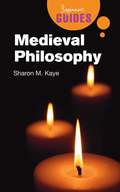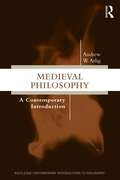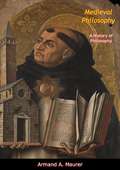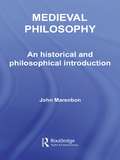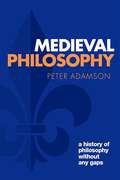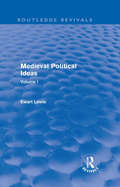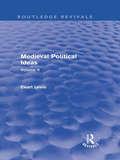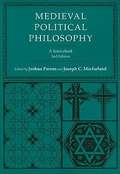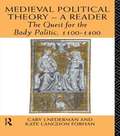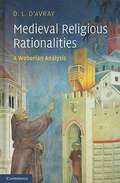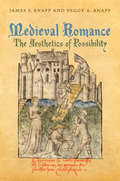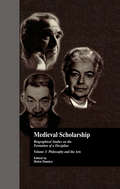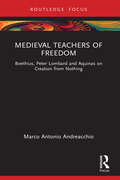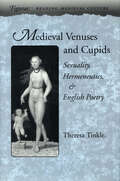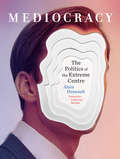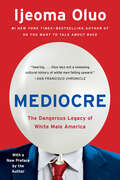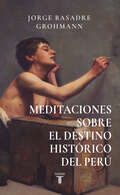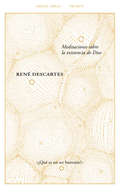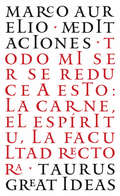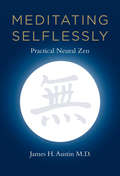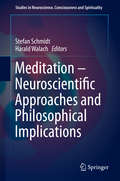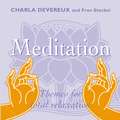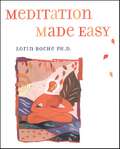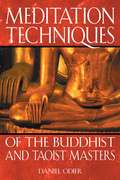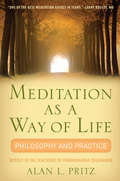- Table View
- List View
Medieval Philosophy: A Beginner's Guide (Beginner's Guides)
by Sharon M. KayeWhy do good things happen to bad people? Can we prove whether God exists? What is the difference between right and wrong? Medieval Philosophers were centrally concerned with such questions: questions which are as relevant today as a thousand years ago when the likes of Anselm and Aquinas sought to resolve them. In this fast-paced, enlightening guide, Sharon M. Kaye takes us on a whistle-stop tour of medieval philosophy, revealing the debt it owes to Aristotle and Plato, and showing how medieval thought is still inspiring philosophers and thinkers today. With new translations of numerous key extracts from across the centuries, Kaye directly involves the reader with the philosophers' writings, and introduces the criticisms levied against them. With helpful text boxes throughout the book detailing key figures and philosophical movements, this is an invaluable reference for students of all levels, and will prove an entertaining primer for the general reader. Sharon M. Kaye is Associate Professor of Philosophy at John Carroll University. She is the author of On Ockham and On Augustine.
Medieval Philosophy: A Contemporary Introduction (Routledge Contemporary Introductions to Philosophy)
by Andrew W ArligThis book presents a new, contemporary introduction to medieval philosophy as it was practiced in all its variety in Western Europe and the Near East. It assumes only a minimal familiarity with philosophy, the sort that an undergraduate introduction to philosophy might provide, and it is arranged topically around questions and themes that will appeal to a contemporary audience. In addition to some of the perennial questions posed by philosophers, such as "Can we know anything, and if so, what?", "What is the fundamental nature of reality?", and "What does human flourishing consist in?", this volume looks at what medieval thinkers had to say, for instance, about our obligations towards animals and the environment, freedom of speech, and how best to organize ourselves politically. The book examines certain aspects of the thought of several well-known medieval figures, but it also introduces students to many important, yet underappreciated figures and traditions. It includes guidance for how to read medieval texts, provokes reflection through a series of study questions at the end of each chapter, and gives pointers for where interested readers can continue their exploration of medieval philosophy and medieval thought more generally. Key Features Covers the contributions of women to medieval philosophy, providing students with a fuller understanding of who did philosophy during the Middle Ages Includes a focus on certain topics that are usually ignored, such as animal rights, love, and political philosophy, providing students with a fuller range of interests that medieval philosophers had Gives space to non-Aristotelian forms of medieval thought Includes useful features for student readers like study questions and suggestions for further reading in each chapter
Medieval Philosophy: A History of Philosophy (Etienne Gilson Ser.)
by Armand A. MaurerThis History of Philosophy is intended as an introduction to philosophy itself. The approaches to philosophy are many, but if one aims to give the reader, beyond mere factual information, a genuine philosophical formation, the historical approach becomes a necessity. Much more important than knowledge about philosophy is a true notion of what it is to philosophize. And what better way is there to learn to philosophize than to observe the great philosophers of the past? If one has the understanding and the patience to follow the discussions of Plato, Aristotle, Thomas Aquinas, or Kant, he cannot fail to appreciate what it means to philosophize. And, equally important, he will have a standard of philosophical excellence that will deter him from confusing a shabby piece of philosophy with one that is first-rate.—Etienne Gilson“This is the second volume of a four volume History of Philosophy written under the general editorship of Etienne Gilson. The series is intended for the serious, but elementary, student of the subject and fulfills that purpose very well. Covering the period from St. Augustine (d. 430) to Francis Suarez (d. 1617), this beautifully made book deals with schools and developments as well as individuals, but is restricted to philosophy and does not wander off either to theology or to general intellectual history. It is a pleasure to read and to hold.”—Carroll Quigley
Medieval Philosophy: An Historical and Philosophical Introduction
by John MarenbonThis new introduction replaces Marenbon's best-selling editions Early Medieval Philosophy (1983) and Later Medieval Philosophy (1987) to present a single authoritative and comprehensive study of the period. It gives a lucid and engaging account of the history of philosophy in the Middle Ages, discussing the main writers and ideas, the social and intellectual contexts, and the important concepts used in medieval philosophy. Medieval Philosophy gives a chronological account which: treats all four main traditions of philosophy that stem from the Greek heritage of late antiquity: Greek Christian philosophy, Latin philosophy, Arabic philosophy and Jewish philosophy provides a series of 'study' sections for close attention to arguments and shorter 'interludes' that point to the wider questions of the intellectual context combines philosophical analysis with historical background includes a helpful detailed guide to further reading and an extensive bibliography All students of medieval philosophy, medieval history, theology or religion will find this necessary reading.
Medieval Philosophy: Studies In Ancient And Medieval Philosophy (Conway Lectures In Medieval Studies)
by Peter AdamsonPeter Adamson presents a lively introduction to six hundred years of European philosophy, from the beginning of the ninth century to the end of the fourteenth century. The medieval period is one of the richest in the history of philosophy, yet one of the least widely known. Adamson introduces us to some of the greatest thinkers of the Western intellectual tradition, including Peter Abelard, Anselm of Canterbury, Thomas Aquinas, John Duns Scotus, William of Ockham, and Roger Bacon. And the medieval period was notable for the emergence of great women thinkers, including Hildegard of Bingen, Marguerite Porete, and Julian of Norwich. Original ideas and arguments were developed in every branch of philosophy during this period - not just philosophy of religion and theology, but metaphysics, philosophy of logic and language, moral and political theory, psychology, and the foundations of mathematics and natural science.
Medieval Political Ideas: Volume I (Routledge Revivals)
by Ewart LewisFirst published in 1954, this book explores the political ideas of the Middle Ages. It covers the period from the investiture struggle to the end of the fifteenth century and provides comprehensive readings of otherwise inaccessible source material. Each chapter begins with an introductory essay on the subject at hand that leads to a number of translated passages, numerous enough to display a variety of opinion and long enough to indicate the process of thought as well as its conclusions. This book is the first of a two volume set and will be useful to teachers and advanced students of political theory and medieval history. Topics discussed in this volume include law, property and lordship, political authority and community.
Medieval Political Ideas: Volume II (Routledge Revivals)
by Ewart LewisFirst published in 1954, this book explores the political ideas of the Middle Ages. It covers the period from the investiture struggle to the end of the fifteenth century and provides comprehensive readings of otherwise inaccessible source material. Each chapter begins with an introductory essay on the subject at hand that leads to a number of translated passages, numerous enough to display a variety of opinion and long enough to indicate the process of thought as well as its conclusions. This book is the second of a two volume set and will be useful to teachers and advanced students of political theory and medieval history. Topics discussed in this volume include authority in the Church, the problem of the Empire and the relationship between the Church and the State.
Medieval Political Philosophy: A Sourcebook
by Joshua Parens Joseph MacfarlandMedieval Political Philosophy: A Sourcebook, edited by Ralph Lerner and Muhsin Mahdi, has been a classroom favorite since its publication in 1963. When it first appeared, it was the only anthology of medieval political philosophy to contain major texts from all three Western monotheistic traditions--Christianity, Judaism, and Islam--and that claim remains true today. This new edition of this classic text of political philosophy--revised and enlarged by Joshua Parens and Joseph C. Macfarland--will make accessible to today's students the insights of these profound medieval thinkers. <p><p> Prior to the modern separation of religion from politics, these medieval thinkers explored a variety of approaches to the relation between religion and politics--approaches that prompted renewed interest in a world divided over how best to relate the two. For the authors gathered in this volume--including Alfarabi, Alghazali, Averroes, Maimonides, Judah Halevi, Thomas Aquinas, Boethius of Dacia, and Dante Alighieri among many others--there was a greater uniformity of general intention than at any other period. All of these authors studied the works of classical political philosophy and considered in a variety of ways the implications of this political thought for their contemporary situation in a monotheistic religious community.
Medieval Political Theory: The Quest for the Body Politic, 1100-1400
by Cary J. Nederman Kate L. ForhanA textbook anthology of important works of political thought revealing the development of ideas from the 12th to the 15th centuries. Includes new translations of both well-known and ignored writers, and an introductory overview.
Medieval Religious Rationalities: A Weberian Analysis
by D. L. D'AvrayInspired by the social theories of Max Weber, David d'Avray asks in what senses medieval religion was rational and, in doing so, proposes a new approach to the study of the medieval past. Applying ideas developed in his companion volume on Rationalities in History, he explores how values, instrumental calculation, legal formality and substantive rationality interact and the ways in which medieval beliefs were strengthened by their mutual connections, by experience, and by mental images. He sheds new light on key themes and figures in medieval religion ranging from conversion, miracles and the ideas of Bernard of Clairvaux to Trinitarianism, papal government and Francis of Assisi's charismatic authority. This book shows how values and instrumental calculation affect each other in practice and demonstrates the ways in which the application of social theory can be used to generate fresh empirical research as well as new interpretative insights.
Medieval Romance: The Aesthetics of Possibility
by James Knapp Peggy KnappWidely heard and read throughout the middle ages, romance literature has persisted for centuries and has lately re-emerged in the form of speculative fiction, inviting readers to step out of the actual world and experience the intriguing pleasure of possibility. Medieval Romance is the first study to focus on the deep philosophical underpinnings of the genre’s fictional worlds. James F. Knapp and Peggy A. Knapp uniquely utilize Leibniz’s “possible worlds” theory, Kant’s aesthetic reflections, and Gadamer’s writings on the apprehension of language over time, to bring the romance genre into critical dialogue with fundamental questions of philosophical aesthetics, modal logic, and the hermeneutics of literary transmission. The authors’ compelling and illuminating analysis of six instances of medieval secular writing, including that of Marie de France, the Gawain-poet, and Chaucer demonstrates how the extravagantly imagined worlds of romance invite reflection about the nature of the real. These stories, which have delighted readers for hundreds of years, do so because the impossible fictions of one era prefigure desired realities for later generations.
Medieval Scholarship: Biographical Studies on the Formation of a Discipline: Religion and Art (Garland Library of Medieval Literature)
by Helen Damico Donald Fennema Karmen LenzFirst published in 2000. Routledge is an imprint of Taylor & Francis, an informa company.
Medieval Teachers of Freedom: Boethius, Peter Lombard and Aquinas on Creation from Nothing (Anglo-Italian Renaissance Studies)
by Marco Antonio AndreacchioMedieval debates over "divine creation" are systematically obscured in our age by the conflict between "Intelligent Design" Creationists and Evolutionists. The present investigation cuts through the web of contemporary conflicts to examine problems seated at the heart of medieval talk about creation. From three representative authors we learn that the doctrine of divine creation is supposed to invite understanding of the relation between artistic freedom and natural necessity, of the very essence of causality, and thereby of the nexus between experience (our world of empirical determinations) and reality (the absolute indetermination of eternal being). Most importantly, medieval scholarship shows us that the problems it addresses are originally inherent in the understanding itself, whereby the question of being emerges as inseparable from the question of interpretation.
Medieval Venuses and Cupids
by Theresa TinkleMedieval Venuses and Cupids analyses the transformations of the love deities in later Middle English Chaucerian poetry, academic Latin discourses on classical myth (including astrology, natural philosophy, and commentaries on classical Roman literature), and French conventions that associate Venus and Cupid with Ovidian arts of love. Whereas existing studies of Venus and Cupid contend that they always and everywhere represent two loves (good and evil), the author argues that medieval discourses actually promulgate diverse, multiple, and often contradictory meanings for the deities. The book establishes the range of meanings bestowed on the deities through the later Middle Ages, and draws on feminist and cultural theories to offer new models for interpreting both academic Latin discourses and vernacular poetry.
Mediocracy: The Politics of the Extreme Centre
by Alain DeneaultThere was no Reichstag fire. No storming of the Bastille. No mutiny on the Aurora. Instead, the mediocre have seized power without firing a single shot. They rose to power on the tide of an economy where workers produce assembly-line meals without knowing how to cook at home, give customers instructions over the phone that they themselves don’t understand, or sell books and newspapers that they never read. Canadian intellectual juggernaut Alain Deneault has taken on all kinds of evildoers: mining companies, tax-dodgers, and corporate criminals. Now he takes on the most menacing threat of all: the mediocre.
Mediocre: The Dangerous Legacy of White Male America
by Ijeoma OluoFrom the author of the New York Times bestseller So You Want to Talk About Race, a subversive history of white male American identity.What happens to a country that tells generation after generation of white men that they deserve power? What happens when success is defined by status over women and people of color, instead of by actual accomplishments?Through the last 150 years of American history -- from the post-reconstruction South and the mythic stories of cowboys in the West, to the present-day controversy over NFL protests and the backlash against the rise of women in politics -- Ijeoma Oluo exposes the devastating consequences of white male supremacy on women, people of color, and white men themselves. Mediocre investigates the real costs of this phenomenon in order to imagine a new white male identity, one free from racism and sexism.As provocative as it is essential, this book will upend everything you thought you knew about American identity and offers a bold new vision of American greatness.
Meditaciones sobre el destino histórico del Perú
by Jorge Basadre GrohmannEL MÁS IMPORTANTE PENSADOR DEL SIGLO XX EN UNA BÚSQUEDA INTELIGENTE Y EMOTIVA DE LA RAZÓN HISTÓRICA DEL PERÚ Pieza representativa de la monumental obra de Jorge Basadre Grohmann, este volumen de artículos y ensayos, aparecidos en diarios y revistas del país y el extranjero, es uno de los mejores esfuerzos intelectuales del siglo pasado por comprender, interpretar y definir la esencia del desarrollo histórico del Perú.Entre sus páginas el autor ejerce un llamado para la conformación de "una conciencia de la patria y de la integración nacional". Lo hace procurando dirigir su discurso al ciudadano, en especial a los educadores y las nuevas generaciones, en quienes cifra el destino de la nación. A ambos los conmina a pensar el Perú como una continuidad que atraviesa las épocas y los periodos y se proyecta generoso siempre hacia el futuro, lejos de los compartimentos estancos propios del sistema educativo, así como del "eruditismo infértil" y de las luchas fratricidas. En suma, una apuesta por el sí, por la promesa democrática, por la integración del territorio y sus habitantes, incluso a pesar de "la barata retórica electoral" y los reveses del siglo XIX. Meditaciones sobre el destino histórico del Perú es un conjunto de textos de esmerado rigor pedagógico y filosófico, en el que abunda la lucidez y el optimismo. De allí que este libro resulte insoslayable para entender, aún hoy, por qué debemos buscar el bien común por encima de nuestras diferencias políticas, sociales y culturales. «… estas Meditaciones son el sustento de la obra de Basadre, los planos de la catedral. Aquí están sus motivaciones y esperanzas, sus juicios más generales, las leyes y axiomas del sistema basadriano». Alberto Vergara
Meditaciones sobre la existencia de Dios (Serie Great Ideas #40)
by René Descartes40 grandes ideas que han cambiado el mundo. Considerado el padre de la filosofía occidental moderna, Descartes trató de mirar más allá de las ideas establecidas y crear un sistema de pensamiento basado en la razón. En su profundo trabajo medita sobre la duda, el alma humana, Dios, la verdad y la naturaleza de la existencia en sí misma. A lo largo de la historia, algunos libros han cambiado el mundo. Han transformado la manera en que nos vemos a nosotros mismos y a los demás. Han inspirado el debate, la discordia, la guerra y la revolución. Han iluminado, indignado, provocado y consolado. Han enriquecido vidas, y también las han destruido. Taurus publica las obras de los grandes pensadores, pioneros, radicales y visionarios cuyas ideas sacudieron la civilización y nos impulsaron a ser quienes somos. La crítica ha dicho sobre la colección «Great Ideas»...«De veras que la edición es primorosa y pocas veces contenido y continente pueden encontrarse mejor ensamblados y unidos. ¡Qué portadas! Para enmarcar. [...] Ante las "Great Ideas", solo cabe quitarse el sombrero. ¡Chapeu!»ABC
Meditaciones: Selección (Serie Great Ideas #Volumen 12)
by Marco AurelioIdeas que han cambiado el mundo. A lo largo de la historia, algunos libros han cambiado el mundo. Han transformado la manera en que nos vemos a nosotros mismos y a los demás. Han inspirado el debate, la discordia, la guerra y la revolución. Han iluminado, indignado, provocado y consolado. Han enriquecido vidas, y también las han destruido. Taurus publica las obras de los grandes pensadores, pioneros, radicales y visionarios cuyas ideas sacudieron la civilización y nos impulsaron a ser quienes somos. Las Meditaciones del gran emperador-filósofo romano Marco Aurelio son sencillas aunque profundas obras de filosofía estoica que, a día de hoy, continúan ofreciendo a muchos orientación y consuelo con su elocuencia, sabiduría y humildad. Comentarios sobre la colección Great Ideas:«De veras que la edición es primorosa y pocas veces contenido y continente pueden encontrarse mejor ensamblados y unidos. ¡Qué portadas! Para enmarcar. [...] Ante las Great Ideas, solo cabe quitarse el sombrero. ¡Chapeau!»ABC «Taurus propone un doble envite con este lanzamiento. Por un lado aumenta su compromiso con el ensayo; por otro, recupera el gusto por la estética. A los volúmenes se les ha proporcionado una portada delicada y cuidada (copian el original británico) que invita a la lectura.»La Razón «Un fenómeno editorial.»The Guardian «Aparte de los contenidos, en general muy bien elegidos, son tan bonitos que si los ven seguro que cae alguno.»El País «Ideas revolucionarias, crónicas de exploraciones, pensamientos radicales... vuelven a la vida en estas cuidadísimas ediciones, muy atractivas para nuevos lectores.»Mujer Hoy «Grandes ideas bien envueltas. De Cicerón a Darwin, esta colección entra por los ojos.»Rolling Stone «Original y bella iniciativa la emprendida por Taurus con su colección Great Ideas.»Cambio 16 «Hay libros inmortales, libros únicos que contienen pensamientos y reflexiones capaces de cambiar el mundo, tesoros en miniatura reagrupados en la colección Great ideas.»Diario de León
Meditating Selflessly: Practical Neural Zen
by James H. AustinA guide to Zen meditative practice informed by the latest findings in brain research. This is not the usual kind of self-help book. Indeed, its major premise heeds a Zen master's advice to be less self-centered. Yes, it is "one more book of words about Zen," as the author concedes, yet this book explains meditative practices from the perspective of a "neural Zen." The latest findings in brain research inform its suggestions. In Meditating Selflessly, James Austin—Zen practitioner, neurologist, and author of three acclaimed books on Zen and neuroscience—guides readers toward that open awareness already awaiting them on the cushion and in the natural world. Austin offers concrete advice—often in a simplified question-and-answer format—about different ways to meditate. He clarifies both the concentrative and receptive styles of meditation. Drawing widely from the exciting new field of contemplative neuroscience, Austin helps resolve an ancient paradox: why both insight wisdom and selflessness arise simultaneously during enlightened states of consciousness.
Meditation - Neuroscientific Approaches and Philosophical Implications
by Harald Walach Stefan SchmidtThis volume features a collection of essays on consciousness, which has become one of the hot topics at the crossroads between neuroscience, philosophy, and religious studies. Is consciousness something the brain produces? How can we study it? Is there just one type of consciousness or are there different states that can be discriminated? Are so called "higher states of consciousness" that some people report during meditation pointing towards a new understanding of consciousness? Meditation research is a new discipline that shows new inroads into the study of consciousness. If a meditative practice changes brain structure itself this is direct proof of the causal influence of consciousness onto its substrate. If different states of consciousness can be linked with properties and states of the brain this can be used to study consciousness more directly. If the sense of self is modifiable through meditative techniques and this can be objectively shown through neuro-imaging, this has profound implications for our understanding of who we are. Can consciousness, in deep states of meditative absorption, actually access some aspect of reality which we normally don't? Meditation research can potentially foster us with a new access to the phenomenological method in general. This has even been branded with a new catch-phrase: Contemplative Science. It brings together the most modern neuroscientific approach and the most advanced phenomenological methodology of studying the mind from within, through highly skilled self-observation that has gone through many thousand hours of honing the capacity to look carefully, without distraction. This book addresses these issues by bringing together some of the leading researchers and thinkers in the field. The scope of the volume reaches from first person neuroscience to Indian philosophy, from pedagogic applications to epistemological aspects and from compassion meditation to the study of brain activity.
Meditation Book: Themes for Total Relaxation (Book-in-a-box Ser.)
by Fran Stockel Charla DevereuxBased on the best-selling Book-in-a-Box kits, The Meditation Book will help you to enter a tranquil state and feel completely calm and composed. It tells you all you need to know to make meditation a part of your daily life.
Meditation Made Easy
by Lorin RocheYou′ve probably heard about the benefits of meditation: Sharper thinking, reduced stress, improved concentration, lower blood pressure, even increased sexual pleasure , all of these positive effects have been confirmed by science. In this uniquely accessible guide, Lorin Roche shows that meditation is that easy , and pleasurable. Roche answers questions and debunks meditation myths, and gives three easy-to-follow techniques for getting started 塴he Do Nothing Technique," "Salute Each of the Senses," and "Feeling at Home Exercise". He and shows you how to integrate "mini meditations" into spare moments of the day, from savouring morning coffee to taking advantage of the five minutes before a meeting. He explains how to overcome meditation obstacles, customise meditation to your own needs, and use your breath, voice, and attention as meditation aids. And he shows how meditation will give you the power to explore your inner passions , and enrich your sense of self.
Meditation Techniques of the Buddhist and Taoist Masters
by Daniel OdierA guide to the mental disciplines and visualizations that Masters have used for ages in their quest for illumination. * An insider's view of specific meditation techniques and the steps necessary for a wide variety of * Buddhist and Taoist meditation practices. * By the author of Tantric Quest (15,000 sold) and Desire: The Tantric Path to Awakening. The esoteric practices followed in the quest for divinity generally remain a secret to the world--kept cloistered away for only the most ascetic practitioners. Now Daniel Odier, having immersed himself in the life and spiritual practices of Buddhist and Taoist monasteries throughout India, Nepal, Sri Lanka, Thailand, and Japan, reveals actual teachings passed on by the sages who are living expressions of their tradition. Looking beyond doctrine, dogma, and philosophical treatises that ignore direct experiences of the practice, Odier provides a direct path to the heart of the religious experience that can be discovered through meditation. Beginning with the simple and fundamental steps necessary to prepare for meditation, Odier guides the reader through the specifics of the mental disciplines and visualizations that Buddhist and Taoist masters have used for ages in their quest for illumination. To devote oneself to meditation, in the sense understood by Buddhists and Taoists, is to realize the understanding of how every fiber of our being converges with all creation. Meditation Techniques of the Buddhist and Taoist Masters is a valuable guide to all who are in search of that realization.
Meditation as a Way of Life
by Alan L. PritzAmong primers on meditation, this book is exceptional in how it guides readers who treasure inner growth and are looking for reliable direction on how to achieve it in an authentic and sustainable way. The author, a student of the Indian yogi Paramahansa Yogananda, distills the teachings of many other spiritual traditions and religions, including Christianity, into an interfaith perspective that will appeal to all seekers of the divine. Specific elements include the foundations of spiritual practice; the benefits of energy-building exercises, affirmations, and healthy lifestyle regimens; instructions in mantra practice and inner-sound meditation; techniques for effective prayer; and guidelines to measure inner practice. The book's accessible narrative and universal themes make it enjoyable to read and life enhancing to apply.
